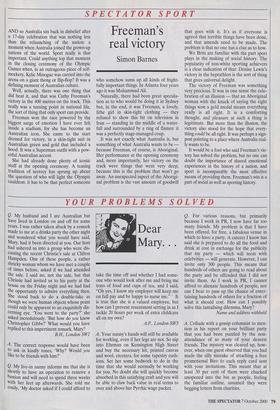SPECTATOR SPORT
Freeman's real victory
Simon Barnes
AND so Australia sits back in disbelief after a 17-day celebration that was nothing less than the relaunching of the nation: a moment when Australia joined the grown-up nations of the world. Sport really is that important. Could anything top that moment in the closing ceremony of the Olympic Games when, in an outrageous piece of self- mockery, Kylie Minogue was carried into the arena on a giant thong or flip-flop? It was a defining moment of Australian culture.
Well, actually, there was one thing that did beat it, and that was Cathy Freeman's victory in the 400 metres on the track. This really was a turning point in national life, the sort of thing that only sport can provide.
Freeman won the race powered by the biggest surge of emotion I have ever felt inside a stadium, for she has become an Australian icon. She came to the start dressed for victory, in a skin-tight suit in Australian green and gold that included a hood. It was a Superman outfit with a pow- erful Australian accent.
She had already done plenty of iconic stuff at the opening ceremony. A teasing tradition of secrecy has sprung up about the question of who will light the Olympic cauldron: it has to be that perfect someone who somehow sums up all kinds of fright- fully important things. In Atlanta four years ago it was Muhammad Ali.
Naturally, there had been great specula- tion as to who would be doing it in Sydney but, in the end, it was Freeman, a lovely, lithe girl in skin-tight clothing — they refused to show this bit on television in Iran — standing in the middle of a water- fall and surrounded by a ring of flames: it was a perfectly stage-managed coup.
It was not exactly what Australia is, but something of what Australia wants to be because Freeman, of course, is Aboriginal. Her performance at the opening ceremony and, more importantly, her victory on the track were things that went very deep, because this is the problem that won't go away. An unexpected aspect of the Aborigi- nal problem is the vast amount of goodwill that goes with it. It's as if everyone is agreed that terrible things have been done, and that amends need to be made. The problem is that no one has a clue as to how.
We Brits are familiar with the part sport plays in the making of social history. The popularity of non-white sporting achievers is a clear indication of that: Denise Lewis's victory in the heptathlon is the sort of thing that gives universal delight.
The victory of Freeman was something very precious. It was in one sense the cele- bration of an illusion — that an Aboriginal woman with the knack of saying the right things won a gold medal means everything really is all right. It is a comforting thought, and pleasure at such a thing is legitimate. But more than the illusion, the victory also stood for the hope that every- thing could be all right. It was perhaps a sign- post pointing to a place where Australia real- ly wants to be.
It would be a fool who said Freeman's vic- tory has solved the problem, but no one can doubt the importance of shared emotional experiences in the history of a nation, and sport is incomparably the most effective means of providing them. Freeman's win is a part of social as well as sporting history.


















































































 Previous page
Previous page